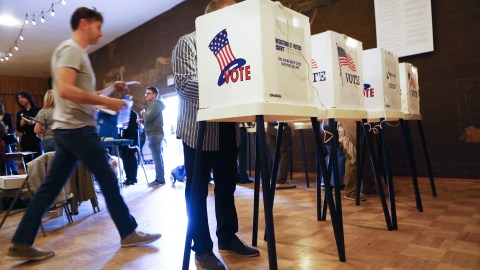Here’s how Americans voted on key 2018 ballot measures

(Photo by Mario Tama/Getty Images)
- Alabama and West Virginia passed amendments that would effectively outlaw abortion if the Supreme Court overturns Roe.
- Medical marijuana is now legal in Missouri and Utah, while Michigan legalized recreational marijuana.
- Missouri and Arkansas will raise the minimum wage significantly over the next several years.
The 2018 midterm elections were marked by massive voter turnout, a record number of female candidates, and no shortage of controversial tactics from state and federal politicians. On Tuesday night it was clear that the results would be mixed, with no clear “blue wave” or “red wall” dominating the country’s political landscape. Democrats managed to capture the House of Representatives while Republicans gained even more seats in the Senate, a result many had broadly predicted.
At the state level, many voters chose to pass landmark amendments and measures on issues like abortion, Medicaid and marijuana. Here’s how the country voted on some of the most significant measures on state ballots in the 2018 midterms.
Abortion
Three states voted on abortion-related ballot measures this year.
Alabama passed Amendment 2, which bans funding for abortions and grants constitutional rights to unborn children. The amendment also states there are no constitutional protections for a woman’s right to an abortion.
West Virginia voters also passed an amendment to ban public funding for abortion and, like Alabama, declare no constitutional protections for abortion. The amendment states that “nothing in this constitution secures or protects a right to abortion or requires the funding of abortion,” including no exceptions for rape, incest or life of the mother.
Both amendments would effectively outlaw abortion if the Supreme Court overturns Roe v. Wade.
Voters in Oregon voted against a measure that would’ve prohibited publicly funded health care programs from covering abortion.
Transgender rights
Massachusetts voters chose to uphold a state law that protects transgender people from discrimination in public places, like locker rooms and bathrooms. The state had already passed legislation prohibiting discrimination on the basis of gender identity in the workplace or for housing, but those protections didn’t allow, say, a transgender person to use the gendered bathroom of their choice.
Critics of the law say it would endanger people by providing predators with easier access to public spaces.
“We are deeply disappointed that the people of Massachusetts will continue to be forced to sacrifice their privacy and safety in the name of political correctness,” said Andrew Beckwith, a legal analyst for No On 3- Keep MA Safe, which opposed the measure.
However, there have been no recorded instances of sexual predators taking advantage of such laws in the 19 states that have already passed them.
Marijuana
Three states legalized marijuana in some form.
Michigan moved to legalize recreational marijuana for adults 21 and older, becoming the first Midwestern state to do so. It’s now legal for residents in Michigan to grow up to 12 plants.
In Missouri, voters faced three medical marijuana measures on the ballot this year. They chose to pass Amendment 2, which legalizes medical marijuana with a 4% sales tax, the funds of which will be used mostly to aid military veterans. Those with a prescription will also be allowed to grow plants at home.
Medical marijuana also passed in Utah, where patients with physician approval can purchase two ounces of marijuana from a dispensary during a two-week period. Residents who live farther than 100 miles from a licensed dispensary will be allowed to grow plants at home.
Minimum wage
Missouri and Arkansas, two red states, both passed incremental increases to the minimum wage: Missouri will raise the wage from $7.85 to $12 by 2023, Arkansas will raise it from $8.50 to $11 by 2021.
Medicaid expansion
Four states had ballot measures on whether to expand or continue expanding Medicaid. Voters in Utah, Nebraska and Idaho moved to expand Medicaid coverage under the Affordable Care Act, including to individuals younger than 65 who live significantly below the poverty line.
Montana voted to expand Medicaid in 2015, but the measure came with a sunset clause that expired at the end of 2018. Yesterday, the state voted not to continue expansion funding.





